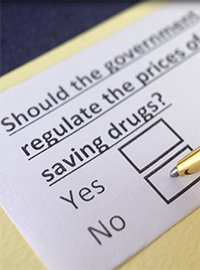| New Study Confirms How Drug Price Controls Kill Investment and Innovation |
 |
|
By Timothy H. Lee
Thursday, December 02 2021 |
Anyone who considers European healthcare a model to emulate or welcomes government drug price controls just received a jarring corrective in the form of a new study by VitalTransformation. For example, as of 2019 late-stage biopharmaceutical venture capital funding in the European Union (EU) amounted to just 3% of the United States level. That’s not a typo. Three percent. Additionally, biopharma startup investments in the EU – which include both internal domestic and foreign direct investments – totaled less than 10% of the U.S. level in 2020. Between 2003 and 2019, biotech investments in the U.S. increased sixfold according to the study, whereas in the EU they remained stagnant for that nearly two-decade stretch. And as of 2017, EU biotech patents per capita amounted to roughly 48% of the U.S. total. Those disparities weren’t always the case, however. The point of the new study is that Europe’s decline occurred as it progressively experimented with counterproductive artificial government price controls: Previous research has shown measurable declines in the EU biopharma ecosystem relative to the United States, as government price controls on medicines expanded in Europe. In 2009, Arthur Daemmrich of the Harvard Business School noted, “Between 1961 and 1980, firms based on the European continent invented and brought to market over sixty percent of new therapeutic molecules… By 1991, firms in the United States were inventing over forty percent of new drugs…” Stephen Eger and Jorg Mahlich, in the Health Economics Review in 2014, found that, “The higher the share of sales made in the [European Medicines Agency] EMA region, the higher is the negative impact – in other words the more sales a company makes in the EMA region beyond a certain threshold, the higher the decline in R&D investment.” Accordingly, government drug price controls in the EU directly correlate with less innovation and disappearing investment in research and development. As the study further demonstrates, in nations employing drug price controls every incremental 10% artificial reduction in drug prices resulted in a 14% decrease in venture capital funding, a 9% decrease in biotech startup funding compared to the U.S. and an 8% increase in delay of access to new medicines. That shouldn’t come as any surprise, because simple economics dictate the inevitably negative consequences of government price controls, from 1970s gas lines to Venezuelan food shortages. A recent University of Chicago analysis, for instance, warned that introduction of drug price controls as contemplated by the Biden Administration and the Pelosi-Schumer Congress would lead to similarly catastrophic effects for American healthcare: [P]rice controls implemented in the United States would lead to a 29.2 to 60.0 percent reduction in R&D from 2021 to 2029. This equates to $952.2 billion to $2.0 trillion in lost R&D spending and 167 to 342 fewer drug approvals during this period. This means annual new drug approvals will be 11.7 to 24.0 percent lower per year from 2021 to 2029, and 45.0 to 92.4 percent lower from 2030 to 2039… Our estimates are conservative, as the entire evidence base is considered, and not only the evidence base for the more R&D sensitive U.S. market. Believe it or not, even the World Health Organization (WHO) reached the same conclusion on the effect of drug price controls: Such price controls, combined with the threat of market lockout or intellectual property infringement, prevent drug companies from charging market rates for their products, while delaying the availability of new cures to patients living in countries implementing those policies. In the face of these realities, advocates of price controls and more centralized control of healthcare may respond that government research and development can cover for any reduction in private R&D investment. Private investment, however, dwarfs government R&D. According to a recent study by the National Association of Manufacturers (NAM), biopharmaceutical innovators invest $83 billion annually in R&D. By comparison, the entire 2019 National Institutes of Health (NIH) budget totaled $39 billion, of which only 9% ($3.5 billion) centered directly on drug R&D. With Congress and the Biden Administration now proposing drug price controls in their “Build Back Better” legislation, Americans must understand the inevitably negative effects that plan would have on healthcare and lifesaving drug innovation and investment. The new VitalTransformation study offers just the latest instructive confirmation. |
Related Articles : |
























